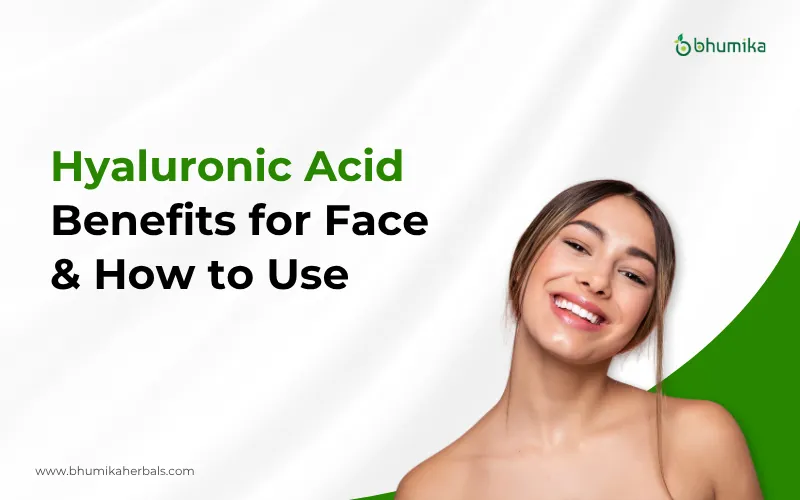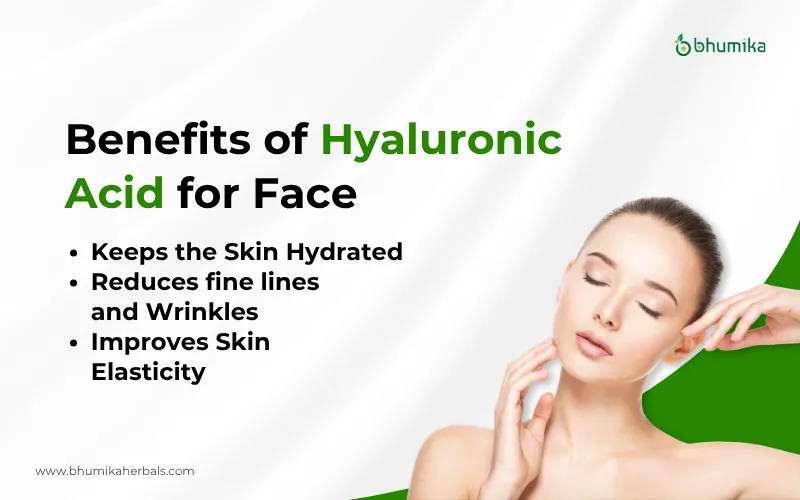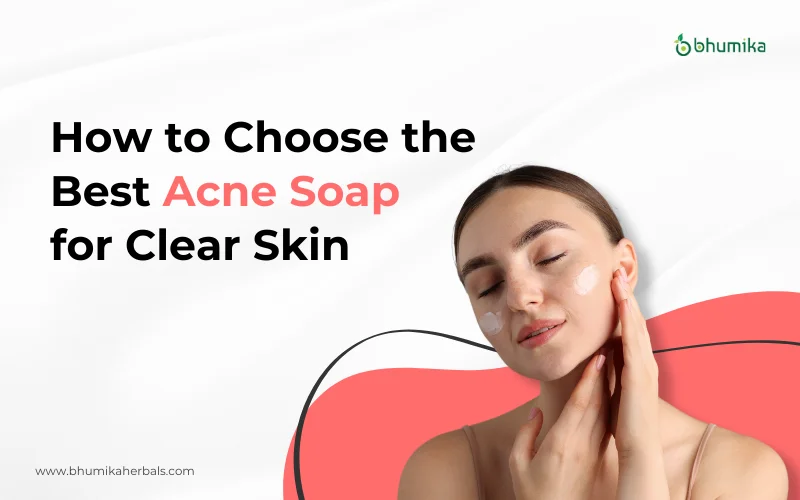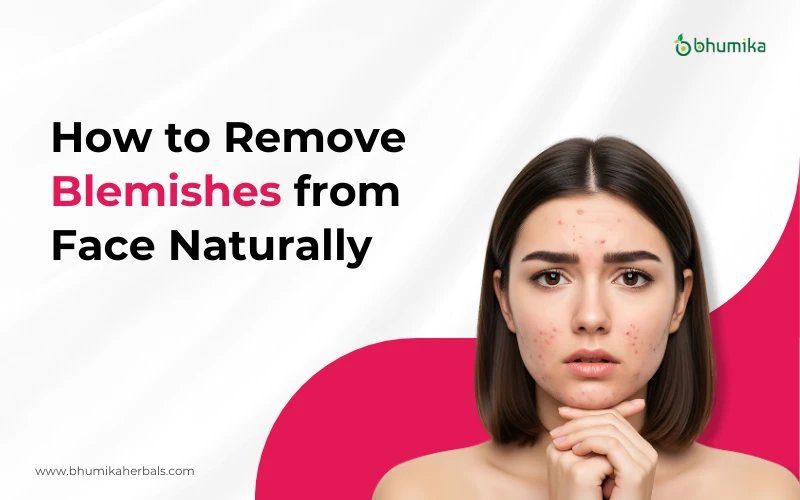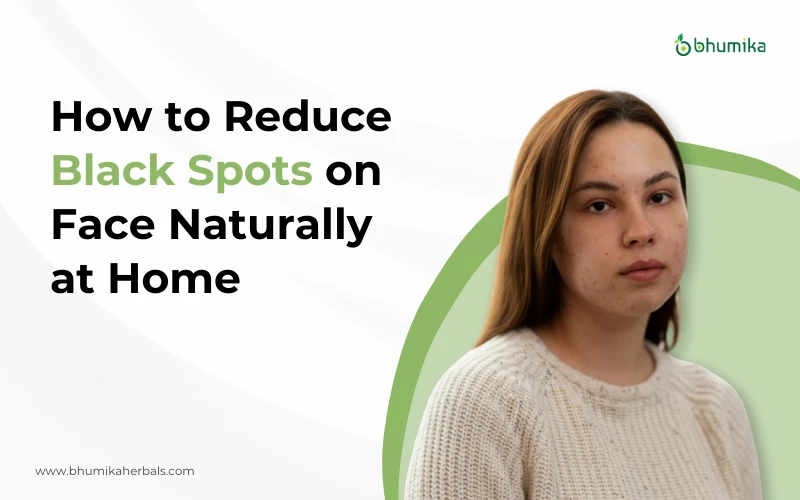Hyaluronic Acid Benefits for Face & How to Use
Share this!
Hyaluronic acid, which has become one of the most widely praised skincare ingredients by beauty experts, influencers, and celebrities, offers hydrated, soft, and brighter skin. It can help retain moisture in the skin, which leaves it soft and nourished. As we age, our natural hyaluronic acid levels drop, so using it in skincare products can have a visible impact.
Before we learn more about the hyaluronic acid benefits for face, it’s essential to understand what hyaluronic acid is, how it works, how to include it in your skincare routine, and possible precautions. When used properly, this ingredient can help your skin look healthier, radiant, and well-hydrated.
What Is Hyaluronic Acid and How Does It Work?
Hyaluronic acid is a natural substance found in our skin, which helps keep our tissues hydrated and lubricated. It can hold up to 1000 times its weight in water, and this makes it a powerful hydrator for skin that keeps it soft and plump.
As we age, the natural levels of hyaluronic acid decrease, which reduces the skin’s ability to retain moisture. When we use skincare products like serums, moisturizers, and sheet masks that contain hyaluronic acid, it can help restore hydration, improve elasticity, and keep your skin healthy and glowing.
Hyaluronic acid works by drawing water into your skin to keep it hydrated. It can make your skin look firmer, smoother, and reduce fine lines. Also, it helps strengthen the skin barrier and improve elasticity for a healthy glow.
Different Types of Hyaluronic Acid for Skin
Even though Hyaluronic acid works for every skin type, knowing its right form can help you get the best results. Each type of hyaluronic acid targets different skin needs and levels of hydration.
1. Hydrolyzed Hyaluronic Acid
This form of hyaluronic acid is broken down into smaller molecules, allowing it to go deeper into your skin and hydrate from within. It works well for oily or combination skin, as it provides inner moisture without making the outer layer greasy.
2. Sodium Hyaluronate
This salt form of hyaluronic acid works as a strong humectant, which means it can draw moisture into the skin. It helps keep the skin soft and smooth and supports the skin barrier by locking in hydration.
3. Sodium Acetylated Hyaluronate
This version stays on the surface of the skin for longer, offering lasting moisture and protection. It’s especially beneficial for dry, dull, or dehydrated skin, as it keeps the outer layer plump and nourished.
Top 10 Hyaluronic Acid Benefits for Face
As we all know, ageing is a natural and graceful process. However, when it happens faster than usual, hyaluronic acid can help slow it down safely and effectively. Here are some of the hyaluronic acid benefits for face, which can help keep your skin healthy, smooth, and youthful without causing irritation or side effects.
1. Keeps the Skin Hydrated
Hyaluronic acid can help restore the skin’s natural moisture balance without clogging pores, so it is ideal for all seasons and skin types.
Without enough moisture, your skin can appear dry, dull, and flaky. Along with drinking plenty of water every day, giving your skin a dose of hyaluronic acid can deeply nourish and rejuvenate its natural radiance.
2. Protects and Repairs the Skin Barrier
Hyaluronic acid can strengthen and repair the skin barrier, which helps keep it healthy and less prone to damage from bacteria or pollution. Hyaluronic acid acts like a protective layer, safeguarding your skin against UV rays, pollution, and oxidative stress while keeping it smooth, calm, and well-hydrated.
3. Reduces Fine Lines and Wrinkles
According to a 2022 study by the National Library of Medicine, the topical application of hyaluronic acid was found to improve the skin quality and reduce ageing signs. Hyaluronic acid can support collagen production and give you an even skin tone, which in turn helps soften fine lines and wrinkles. Regular use of hyaluronic acid can keep your skin looking smoother, firmer, and more youthful.
4. Improves Skin Elasticity
It helps maintain your skin’s natural elasticity, keeping it firm, plump, and youthful. Your skin will feel tighter and look more toned with consistent use.
5. Smoothens and Softens the Skin
It can boost the elasticity of the skin and fill in tiny lines with moisture, which helps reduce roughness and uneven patches. When you begin to use hyaluronic acid on your skin regularly, your skin will become smooth, soft, and more even in texture.
6. Promotes Healthy Skin Regeneration
By keeping your skin hydrated and protected, hyaluronic acid helps in forming new, healthy skin cells. This natural renewal process will keep your skin looking fresh, youthful, and glowing.
7. Controls oil and Prevents Breakouts
It helps balance the natural oil levels in your skin and keeps it well hydrated, which in turn prevents excess oil buildup and reduces acne, blackheads, and whiteheads.
Learn more:How To Remove Blackheads Naturally
8. Fades Dark Spots and Pigmentation
As hyaluronic acid can boost skin cell renewal, damaged or darkened skin cells are replaced with fresh, healthy ones. Also, it is effective in lightening sunburn marks and acne scars, giving your skin a more even and radiant tone.
Learn more:Ayurvedic Remedies for Pigmentation
9. Soothes and Heals Sunburn
Hyaluronic acid possesses antioxidant and anti-inflammatory properties, which will help the skin to recover quickly by encouraging the growth of new, healthy skin cells. Thus, sunburns are healed at a faster rate, and it also reduces redness and irritation.
10. Enhances Natural Glow
A skin that is well-hydrated will look healthy and fresh, offering you a natural, radiant glow.
Best Ways to Add Hyaluronic Acid to Your Skincare Routine
Here are some effective ways of including hyaluronic acid into your skin routine to keep your skin hydrated, plump, and healthy all day long.
- Serums: As hyaluronic acid serums are concentrated, they are absorbed quickly into your skin, providing deep hydration deeply into the skin. These serums can help reduce dullness and fine lines, and provide an even skin tone, leaving your skin soft and plump.
- Moisturisers: Moisturisers containing hyaluronic acid retain moisture and other active ingredients, which can strengthen the skin barrier and keep your skin hydrated throughout the day or night.
- Cleansers: Begin your skin care routine with a gentle, hydrating cleanser that can help remove dirt, makeup, and excess oil without drying out the skin. Also, it will create a clean base for the rest of your skincare products to work effectively.
- Sunscreens: Sunscreens containing hyaluronic acid can keep your skin hydrated and protect it from harmful UV rays. It also prevents dryness and maintains a healthy, glowing complexion.
- Sheet Masks: Sheet masks infused with hyaluronic acid provide a quick hydration boost, refresh your skin and give it a radiant, plump look instantly.
- Injections (Dermal Fillers): Hyaluronic acid injections, performed by trained professionals, can add volume and reduce wrinkles, offering a fast and effective solution for youthful skin.
Who Can Benefit from Hyaluronic Acid?
Hyaluronic acid suits almost everyone, regardless of age or skin type. Here’s how it helps different skin concerns:
- Dry Skin: Provides deep hydration and helps repair the skin barrier.
- Oily or Acne-Prone Skin: Moisturises your skin without making it greasy or clogging pores.
- Sensitive Skin: It is gentle and soothing on the skin and is unlikely to cause any irritation.
- Ageing Skin: Helps reduce fine lines and wrinkles and improves skin elasticity.
- All Ages: Hyaluronic acid is safe and effective for all age groups.
Hyaluronic Acid Side Effects on Face and Precautions
Applying topical hyaluronic acid is generally considered safe for all skin types. But, in some cases, hyaluronic acid can have some side effects on face if not used properly. Here are a few things to keep in mind:
- Avoid during active skin issues: If your skin has active rashes, redness, acne, or open wounds, it’s best to avoid using hyaluronic acid until your skin calms down, because using it on irritated skin may cause discomfort or worsen the irritation.
- Don’t overuse: Using too much hyaluronic acid can sometimes lead to breakouts, especially for acne-prone skin. Use only the recommended amount to experience hyaluronic acid benefits for face without any side effects.
- Risk of dryness if misused: As Hyaluronic acid works best when combined with a moisturizer and sunscreen, using it without these products might draw moisture away from the skin, leaving it drier instead of hydrated.
- Rare allergic reactions: Even though this side effect is uncommon, some people with very sensitive skin may be allergic to hyaluronic acid. It’s better to do a patch test or consult a dermatologist before adding it to your routine.
Takeaway
Hyaluronic acid is a skincare ingredient that can turn dry, tired skin into a plump, radiant one. The hyaluronic acid benefits for face are numerous, providing deep hydration, a healthy glow, and smooth, youthful-looking skin. It can be used regularly through serums, moisturizers, cleansers, or treatments, and applying them correctly maximizes the benefits.
Related Topics
| Vitamin E Face Mask | Niacinamide Skin Benefits |
| How to Treat Eczema Naturally | How to Reduce Melanin in Skin |
Frequently Asked Questions on Hyaluronic Acid for Face
Can I use hyaluronic acid every day?
Yes, you can use hyaluronic acid every day to keep your skin well-hydrated. It is safe for all skin types, including sensitive skin. For the best results, apply it twice a day on damp skin and follow up with a moisturizer.
Should I apply hyaluronic acid to wet or dry skin?
It’s best to apply hyaluronic acid on damp skin because it will help retain moisture on your skin, keeping it soft and hydrated. When you apply it to completely dry skin, it might draw away the moisture, making your skin feel dry.
Which is better, vitamin C or hyaluronic acid?
Neither vitamin C nor hyaluronic acid is better, and the choice depends on your skincare needs. Hyaluronic acid offers your skin deep hydration and makes it look plump, and hence it is ideal for dry skin. Whereas Vitamin C can brighten the skin, reduce dark spots, boost collagen and protect your skin from damage. For the best results, you can use both together by applying vitamin C first, followed by hyaluronic acid.
Is hyaluronic acid best at night or in the morning?
It can be used both in the morning and at night. When you apply hyaluronic acid in the morning, it will help keep your skin hydrated and protected throughout the day. But when you apply it at night, hyaluronic acid will support your skin’s repair and renewal process. For the best results, include it in both routines.
About the Author
Vishnu Raj
Related Posts
It is not very common to notice white patches on...Read More
Pimples are a common skin concern that comes with endless...Read More
Honey is a common ingredient available in most households, used...Read More
Tadasana, also known as the mountain pose, is considered the...Read More
Blemishes can appear as dark spots, acne marks, or red...Read More
Have you ever looked in the mirror, noticed those tiny...Read More
Today, we are busy with a hectic lifestyle, and it...Read More
Coriander is a kitchen staple that needs no introduction. Found...Read More
Share this!
Share this!
Shop by Concern
Acne & Pimples (9) Dandruff & Scalp Itchiness (6) Dark Circles & Puffy Eyes (4) Dead Skin Cells (6) Dehydrated Skin (4) Dry & Damaged Hair (5) Dryness (4) Dry Scalp (6) Dry Skin (4) Dull Skin (8) Excessive Oilness (4) Face Care (9) Fine Lines & Wrinkles (8) Greying (3) Hair Care (8) Hairfall (6) Hair Loss & Growth (6) Hyper Pigmentation (6) Sandalwood Products (3) Skin Brightening (9) Skin Care (8) Stretch Marks (3) Tanned Skin (5) Uneven Skin Tone/ Pigmentation (6) Uneven Skintone/ Texture (5)

